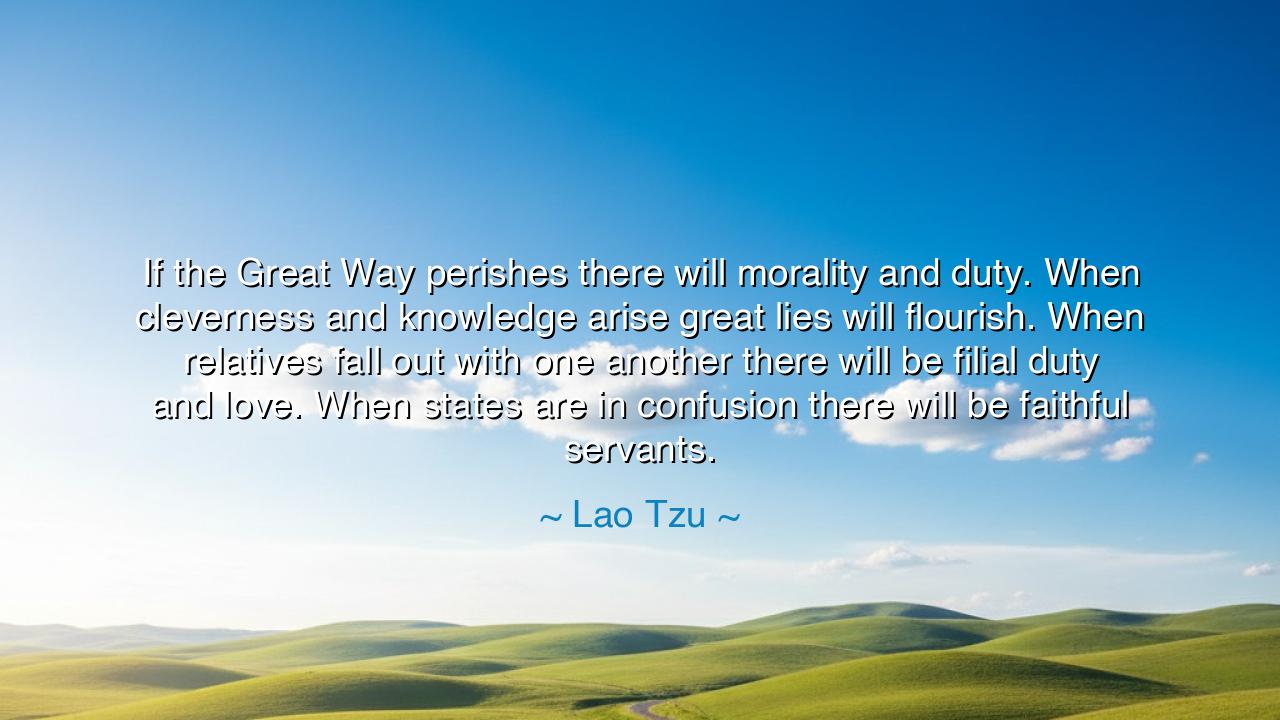
If the Great Way perishes there will morality and duty. When
If the Great Way perishes there will morality and duty. When cleverness and knowledge arise great lies will flourish. When relatives fall out with one another there will be filial duty and love. When states are in confusion there will be faithful servants.






In these profound words, Lao Tzu, the ancient sage of the Tao, reveals one of the deepest paradoxes of human existence: that virtue arises when the Way is lost, that morality, knowledge, and loyalty appear only when the natural order has already begun to decay. “If the Great Way perishes, there will be morality and duty. When cleverness and knowledge arise, great lies will flourish. When relatives fall out with one another, there will be filial duty and love. When states are in confusion, there will be faithful servants.” This is not the cynicism of despair, but the clear sight of wisdom — a lament that when men stray from harmony with nature and truth, they must invent lesser virtues to fill the void left behind.
The Great Way — the Tao — is the eternal order of existence, the unseen river flowing beneath all things. When humanity lives in alignment with it, there is no need for commandments, laws, or doctrines, for all actions naturally accord with truth. The Tao is like the breath: silent, effortless, yet sustaining life itself. But when men forget the Way — when they lose that inner harmony — they begin to craft morality and duty as substitutes. Thus, Lao Tzu warns that what the world often praises as virtue is, in truth, a sign of loss. The more rules we make to govern goodness, the further we have drifted from the natural goodness that once needed no law.
“When cleverness and knowledge arise, great lies will flourish.” Here Lao Tzu speaks against the arrogance of intellect untempered by wisdom. Knowledge, in its pure form, is light — but when men use it to deceive, to dominate, to embellish falsehood, it becomes shadow. In the age of the Tao, knowledge and simplicity were one. But as men grew clever, they learned to twist truth into weapons. The rise of artifice marked the fall of sincerity. In his time, Lao Tzu saw courtiers using rhetoric to mask corruption, ministers flattering kings while betraying the people. In ours, the same pattern endures — words without heart, brilliance without humility, progress without peace.
The sage then turns to the decay of the family, the first kingdom of man. “When relatives fall out with one another, there will be filial duty and love.” What a piercing irony! When true affection wanes, the world begins to preach of love. When unity dies, society must teach obedience. The filial piety that Confucius revered becomes, in Lao Tzu’s eyes, a desperate attempt to restore what has been lost. For in the days when the Way still flourished, love needed no commandment — it flowed as freely as blood through the body. Only when hearts grow cold do we write laws about warmth. Only when the family fractures do we erect shrines to loyalty.
Finally, he laments the decay of governance: “When states are in confusion, there will be faithful servants.” In times of harmony, loyalty is natural and unspoken. But when rulers are corrupt and nations falter, men begin to speak loudly of faithfulness, to prove their virtue against the tide. History offers countless examples. In the late days of the Han dynasty, when empire dissolved into war, ministers proclaimed their loyalty with their deaths. In the fall of Rome, men praised the Republic while its spirit lay buried beneath ambition. Such loyalty is noble, but it is born from ruin. It is the flower that grows only after the forest has burned.
The origin of this teaching lies in Lao Tzu’s vision of decline — a cycle where purity gives birth to pretension, where the simple Way is replaced by the complex machinery of virtue. It is not a rejection of morality, knowledge, or love, but a warning that these are signs of a world out of balance. The sage teaches that the highest good is effortless — like water, it nourishes all and contends with none. When we return to the Way, we no longer need to speak of goodness, for goodness is the air we breathe.
The lesson for our age is clear: the more we shout of virtue, the less of it we possess. To restore the world, one must first restore the Way within oneself — the stillness of mind, the sincerity of heart, the humility before life’s mystery. Let our knowledge be joined with compassion, our morality with silence, our loyalty with understanding. Seek not to appear good, but to be simple and whole. The Tao cannot be forced — it must be remembered, like a melody once forgotten but still echoing in the soul.
So, my child, when the world clamors with duty and doctrine, remember this ancient wisdom: the Great Way has not perished — it only sleeps within you. Walk quietly, act without pride, love without demand, and speak truth without adornment. In doing so, you will not need to prove your virtue, for you will have returned to the source — where no morality is needed, because all is harmony, and the Way walks through you once more.






AAdministratorAdministrator
Welcome, honored guests. Please leave a comment, we will respond soon